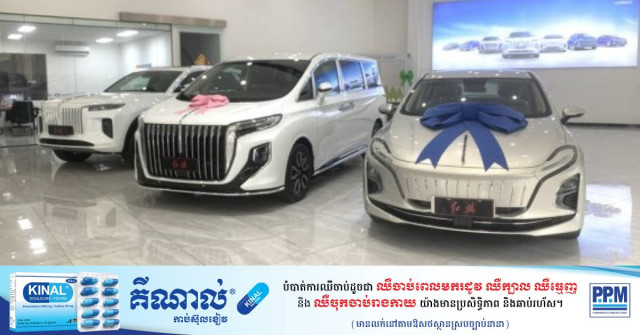Cambodia Can Achieve 2050 EV Targets if Plan Well Implemented: Report

- By Xinhua News Agency
- March 28, 2024 2:10 PM
PHNOM PENH -- Cambodia can achieve its ambitious targets for increasing the proportion of electric vehicles (EVs) on its roads if the kingdom follows a carefully designed plan, said a World Bank report released here Thursday.
The Cambodian government is committed to having 40 percent of electric cars and urban buses, and 70 percent of electric motorbikes by 2050 in order to reduce carbon emissions.
The Southeast Asian country registered a total of 1,335 EVs as of 2023.
As Cambodia continues its economic growth, it is estimated that total motor vehicles in active circulation could increase from the current level of 6 million to 8 million by 2030 and 14 million by 2050, said the World Bank report.
"Moving towards electric vehicles is an achievable target and will help Cambodia reach its ambitious carbon neutrality goal (by 2050)," World Bank country manager Maryam Salim said when launching the report titled "Cambodia: Recommendations to the National Roadmap for Electric Mobility Transition."
The report said to ensure that vehicles newly entering circulation in Cambodia are predominantly EVs rather than gasoline- or diesel-fueled vehicles, Cambodia will need to reform vehicle import and usage regulations in a progressive approach.
It is also recommended to implement policies requiring the mandatory retirement of gasoline- or diesel-fueled vehicles when they reach a certain age, which would raise demand for new vehicles and enable electric vehicles to break into the market sooner.
It added that in the short term, the transition to EVs in Cambodia is expected to be driven by motorcycles and tuk-tuks.
Cambodian Ministry of Economy and Finance's Secretary of State Ros Seilava said the government has been encouraging people to use EVs and electric motorcycles because they are environment-friendly.
"Promoting electric vehicles presents an opportunity for Cambodia to decarbonize transport, achieve the country's ambitious Nationally Determined Contributions, and reach carbon neutrality by 2050," he said.
"This can also help Cambodia integrate with regional and global supply chains, boosting industrial development and job creation," he added.
To achieve these goals, the government has reduced import duties on EVs since 2021 to about 50 percent lower than taxes on traditional internal combustion engine vehicles.
Moeurng Sokmeng, a sales supervisor at the Mingyang Guoji Trading Co., Ltd., which is the sole agent of China's Hongqi brand in Cambodia, said EVs have been gaining momentum in Cambodia thanks to their saving on fuel costs and environmental friendliness.
"Currently, we have sold out a lot of EVs, both small-scale and large-scale EVs, and our EVs have received considerable support from consumers," she told Xinhua. "Hongqi brand EVs are a high-end brand in China, and they are beautifully designed, with high quality."
Udom Pisey, an EV manager at the Car4you Co., Ltd., which imports Letin Mengo EVs from China, said EVs have far fewer moving parts than petrol or diesel vehicles, so maintenance and repair costs are also cheaper than internal combustion vehicles.
"Using EVs saves money, as they are easy to charge and eco-friendly," she told Xinhua.















